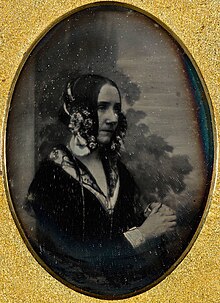
19th-century English mathematicians
The 19th century in science saw the birth of science as a profession; the term scientist was coined in 1833 by William Whewell, which soon replaced the older term of (natural) philosopher. Among the most influential ideas of the 19th century were those of Charles Darwin (alongside the independent research of Alfred Russel Wallace), who in 1859 published the book On the Origin of Species, which introduced the idea of evolution by natural selection.
2 episodes
Episodes in this category also belong to the following categories:
Ada Lovelace
Melvyn Bragg and guests discuss the 19th century mathematician and hard living daughter of Lord Byron, Ada Lovelace.
6 March 2008
Featuring: Patricia Fara, Doron Swade, John Fuegi
Bertrand Russell
Melvyn Bragg and his guests discuss the influential 20th-century British thinker Bertrand Russell, widely regarded as one of the founders of Analytical philosophy.
6 December 2012
Featuring: A. C. Grayling, Mike Beaney, Hilary Greaves
PhilosophyNobel laureates in LiteratureBritish philosophers of languageGeorgistsEnglish political writersFree love advocatesSet theoristsAristotelian philosophersWriters about religion and scienceJerusalem Prize recipientsFellows of Trinity College, CambridgeEnglish logiciansPhilosophers of mathematicsBritish historians of philosophyEmpiricistsOntologistsMetaphysics writersBritish political philosophersFellows of the Royal SocietyMetaphilosophersTheorists on Western civilizationBritish ethicistsPhilosophers of literatureBritish free speech activists20th-century English philosophersAnalytic philosophersEnglish humanistsRhetoric theoristsAtheist philosophersEnglish political philosophersEnglish anti-fascistsEnglish people of Scottish descentPhilosophers of historyEnglish agnostics20th-century atheistsConsequentialistsEnglish socialistsPhilosophers of social scienceBritish philosophers of religionPresidents of the Aristotelian SocietyLogiciansPhilosophers of lawPhilosophers of sexuality19th-century English mathematiciansCritics of work and the work ethicSecular humanistsPhilosophers of technologyPhilosophers of economicsWriters about globalizationBritish philosophers of educationBritish philosophers of culture, English pacifistsBritish philosophers of logicCritics of the Catholic ChurchPeople from MonmouthshireAlumni of Trinity College, CambridgeLinguistic turnPhilosophers of loveEuropean democratic socialistsBritish consciousness researchers and theoristsWriters about activism and social changeEnglish Nobel laureatesMembers of the Order of MeritEnglish prisoners and detaineesUtilitariansIntellectual historians, University of Chicago facultyEnglish scepticsBritish critics of ChristianityEnglish people of Welsh descentUniversal basic income writersBritish philosophers of mind19th-century English philosophersBritish critics of religionsAcademics of the London School of Economics, British philosophers of science19th-century atheistsUniversity of California, Los Angeles facultyAnti-nationalists20th-century English mathematiciansEnglish essayistsFreethought writersBritish atheism activistsWriters about communism19th-century English essayistsEnglish male non-fiction writers

